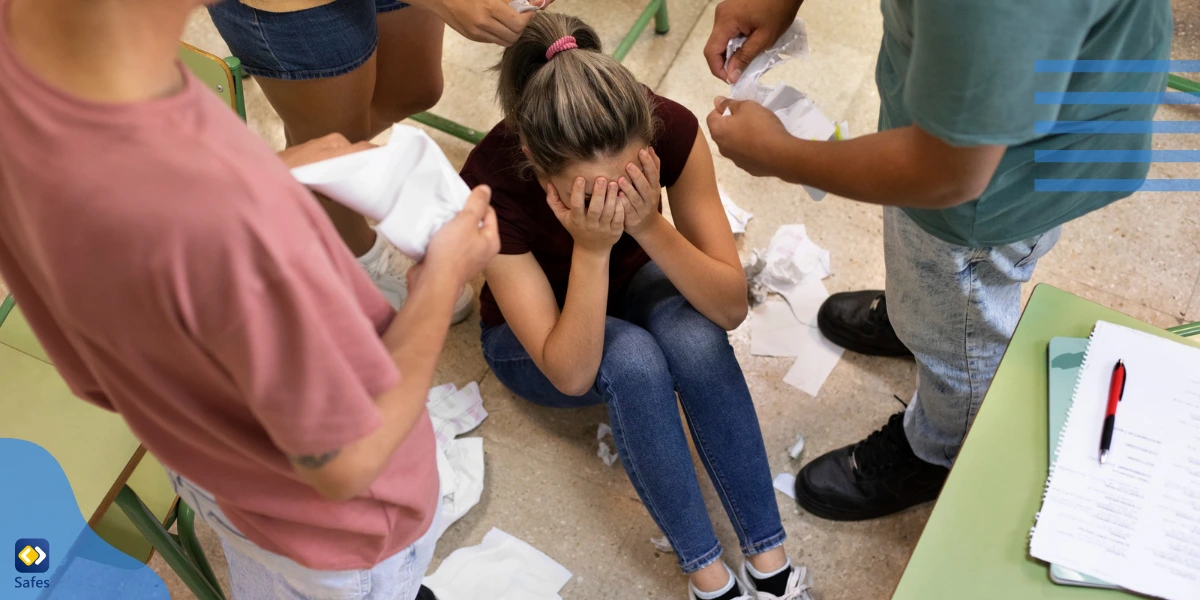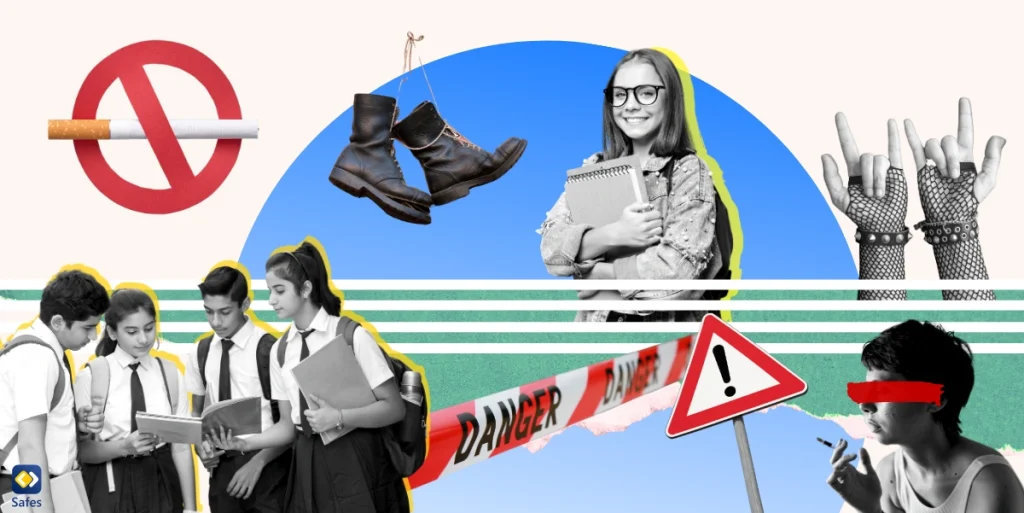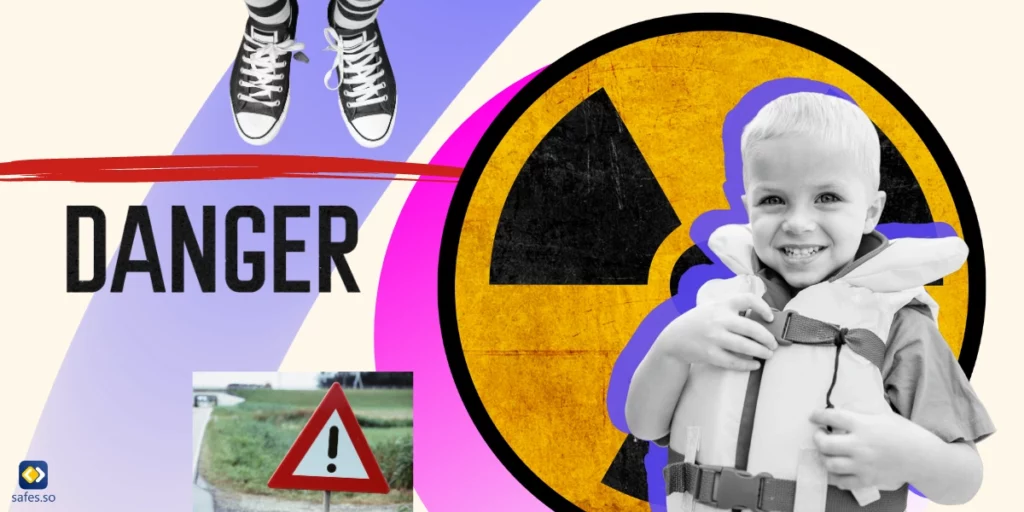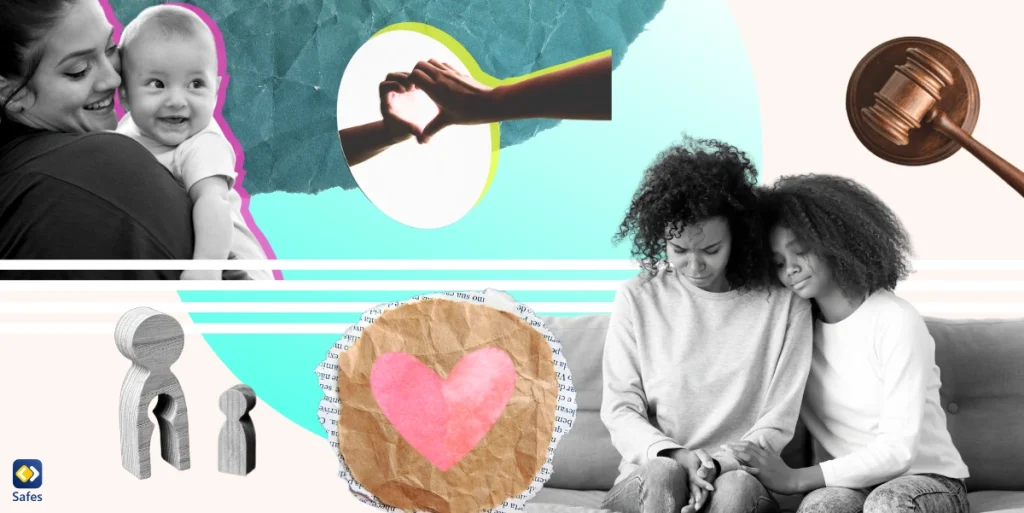Do you have a teenager who has started going to high school? Have you wondered how to protect them from high school cliques? You’re in the right place! High school can be a tough time for some teenagers, and one thing that worries many parents is the influence of cliques. These are tight groups of friends with their own rules and styles. Being part of a clique can affect teens in different ways like feeling left out or pressured to fit in. It’s not just about who’s in and who’s out; it’s about the impact these social circles can have on our teens’ confidence, self-esteem, and overall well-being.
Download and Start Your Free Trial of the Safes Parental Control App
When it comes to protecting your child from the negative influence of school, your role as a protective parent becomes vital. If your teen is about to start high school, make sure to spend a lot of time having open and helpful discussions with them. You can talk about healthy friendships, how to treat others nicely, and respecting others regardless of their gender, age, and ethnicity.
Furthermore, if your teen has joined a clique, ask them about the activities they do within the group. Always remind them of their values and admire who they are. So, they won’t tend to force themselves to fit into a group and lose their identity. Losing teens’ identity is one of the impacts of high school cliques. Make sure to read on to learn about other negative effects and how to handle them.
In this blog post, we want to help you parents understand how cliques can impact your teens and what you can do to help. We’ll give practical advice on how to support your teenagers through these challenges and build their confidence and resilience.
How Do High School Cliques Affect Teenagers?
No one can deny the influence of high school cliques on teenagers. These influences may result from other cliques’ harmful behaviors or the price they need to pay to be part of a clique. Below, you can learn more about the effects that every parent needs to be aware of.
Bullying
Your teenagers are always prone to bullying from other students in high schools. This is also one of the negative influences of forming cliques. The members of a clique usually want to ignore outsiders or compete with other groups. These behaviors usually lead to the act of bullying. Journal of Youth and Adolescence, a multidisciplinary academic journal, suggests bully victimization as one influence of cliques. The study indicates that teenagers tend to select friends within larger friend networks who have similar experiences with bullying. This means that students who have experienced bullying may be drawn to each other in these larger groups. So, they may potentially reinforce negative behaviors or attitudes related to bullying.
There’s no evidence of intentional friend selection based on bullying experiences within smaller cliques. However, the research suggests that friends in cliques can still influence each other’s bullying experiences over time. This means that if one member of a clique engages in bullying behavior or is a victim of bullying, it could influence the behavior of other members, leading to keeping the bullying dynamics. This makes it crucial for parents to know how to stop bullying in schools and safeguard their kids.

Losing the Identity
Cliques can also cause identity loss by exerting pressure on their members to fit into the group’s values and expectations. The group may turn on a member who doesn’t follow these norms, leading to exclusion and loss of identity. When teens feel pressured to follow the rules of a group too much, they might forget who they really are and lose touch with their personal connections.
Mental Health
High school is a crucial time for social development as teenagers navigate friendships and social hierarchy. Positive social interactions can boost self-confidence and emotional resilience. On the other hand, negative experiences like bullying or social exclusion can have long-lasting effects on mental health.
All in all, the ups and downs of adolescence, combined with the pressures of high school, can impact teenagers’ emotional well-being. They may experience mood swings and self-esteem issues. Moreover, they may also struggle with body image as they explore peer relationships and societal expectations.
So, how about taking a look at mental health activities for children and learning helpful methods?
Risky Behaviors
Some teenagers may engage in risky behaviors with their clique members, such as substance abuse, violation, or unsafe sexual activities. They might even have no interest in these activities. However, peer influence, curiosity, and a desire for acceptance can contribute to these behaviors. This is one of the most important clique impacts, as it may have long-term consequences on health and well-being.
How Can We Help Our Teens to Deal with Cliques in Schools?
As a responsible parent, you have a crucial role in keeping your teenagers away from high school clique impacts. Open conversations, being the right model, and practicing healthy standards with your kids can make a difference. Read on to learn how to talk to your teen about these cliques before they go to high school.
- Always encourage your child to have friends from different backgrounds. Talk about how having diverse friendships makes life more interesting.
- Teach your child to be a good friend by helping them learn social skills and understand others’ feelings.
- Supporting your child’s interests and hobbies is also the key, as friendships often form around shared activities. Make sure their hobbies are harmless and have no negative effects.
- One very helpful solution is sharing your own experiences of high school cliques. This way, you can prepare them for what they may face and how to deal with them. For example, you can tell them about your experiences of choosing the wrong friend in high school and its consequences.
- You can help your child trust their own beliefs and values, so they won’t feel pressured to follow others.
- Participating in extracurricular activities, such as art classes, sports, and foreign language courses helps your teen to learn new skills, realize their talents, and make other friend groups. So, they’ll choose their friend groups in high school according to these activities.
My kid has joined a clique, what should I do?
If your teen ever tells you about the clique they joined, make sure to remind them of the important points they need to keep in mind. To make a complete list, we refer to a scientific article reviewed by Elenda Tobi Hessel, published on KidsHealth about helping kids cope with cliques.
- Ask them how the clique members behave toward others outside of the group.
- Talk to them about the difference between spending time with friends and intentionally excluding others.
- Ask your teen if they see any problem with the way they treat other students.
- Avoid asking them constantly about who they are friends with. Instead, you can talk about their friendship quality.
- Remind them of not participating in any activity they don’t feel comfortable or safe with.
- Encourage them to care about others’ feelings and respect their choices, tastes, and interests.
What Are the Categories of High School Cliques?
There are usually several peer groups in high schools, containing teens with shared characteristics, styles, and tastes. Below, you can read about each clique and what makes them distinct from others.
- Jocks or athletes: Sports lovers or those who always participate in sports activities in high school form this clique. This group members have lots of achievements in athletic matches and excel in at least one type of sport.
- Nerds or brains: This clique is characterized by students who are passionate about their studies. They tend to participate in academic events and spend more time studying rather than other activities.
- Overachievers: This group always tries to get good grades and be top in the class. Their desire to be best at anything is their main characteristic.
- Stoners: Also known as potheads and druggies, they’re famous for smoking weeds. They also have their own style in outfits and music.
- Geeks or gamers: From video games to computer programming and technology, these kids are obsessed with this stuff.
- Loners: As the name suggests, they tend to engage in activities alone. Most of the time, their loneliness is intentional and they have no problems with it.
- Theater kids: These are a group of friends who are big fans of school theaters and always take part in them. They are also usually very creative.
- Emos, goths, or punks: Dark outfits, piercings, tattoos, and makeup all are the unique characteristics of this clique. They express themselves with a gothic lifestyle and listen to music in this genre.
- Artists: This clique members love the arts, like painting, playing music, acting, or writing. You can usually find them hanging out in art studios, music rooms, or practicing for plays. They’re known for being creative and expressing themselves in artistic ways.
- Rebels: Have you ever seen a group of teens who aren’t interested in school? Or those who don’t care what others think? They are called rebels in high schools and don’t like following the rules.
- Populars: These students are usually friendly, like to hang out with others, and care about their appearance. This clique consists of the students whom other classmates and teachers love. They tend to be part of student government, clubs, or other activities outside of class.
- Skaters: Wearing baggy and loose clothes, these students always skate around the school. Lessons and school activities aren’t a big deal to them, and they often skip classes.
- The class clown: Those funny students who always make others laugh with their jokes are called the class clowns. They aren’t obviously teachers’ favorites, but others usually like to make friends with them.
- Floaters: At last, there are some high school students who don’t belong to one specific clique. They are friends with different high school groups and are usually polite and friendly.

Are There Still High School Cliques?
Based on a report published by Statista about the US. high school cliques in 2022, 50 percent of American adults confirmed that jocks or athlete cliques existed in their high school time. Also, more than 30 percent voted for popular kids, cheerleaders, nerds, band or choir kids, loners, and stoners to exist in high schools back then.
You may be wondering if there are still cliques in high schools, dividing kids into groups and forcing them to fit into one. So, are there still such cliques? The short answer would be no. The fact is that the cliques you see on TV shows and movies are exaggerated versions of this reality. Moreover, each school has a different environment, based on its location, and educational system. So, the types of cliques may not be the same in every two schools.
In real life, people make friends with others based on the things they have in common. So, there are, for sure, various groups of friends in high schools that may consist of athletes, rich kids, and nerds. However, this image of school cliques that consist of students, all excelling at the clique values and having no other friends is far from reality.
How Do Parental Control Apps Help Protect Your Teens from Clique Effects?
Once smartphones found their way into our lives, kids became more susceptible to cyber world threats. As mentioned earlier, doing harmful activities is one of the impacts of school cliques. However, if these activities are happening on social media and through mobile phones, you can easily monitor them. A parental control app can help parents control their teens’ online activities, allowing them to intervene and prevent potential harm caused by clique dynamics.
These apps enable parents to track their children’s interactions on social media platforms, messaging apps, and other online forums. By staying informed about their teen’s digital interactions, parents can identify cyberbullying, exclusion, or other harmful behaviors associated with cliques. By and large, parental control apps provide an approach to protecting teens from the consequences of clique behavior in the digital age.

Final Words
By working together, we can make sure our teens have the tools they need to navigate high school friendships in a positive way. With the tips provided in this article, you can encourage healthy relationships, boost self-confidence, and equip your teens with strategies to handle peer pressure. Moreover, you can benefit from our parental control app to ensure your children are safe in the cyber world. You can download the app for Android and iOS.
Did you know your smartphone has a built-in parental control system? You can check the instructions on iPhone parental controls and learn how to activate it. One of the pitfalls is that it might not include all the features, such as filtering searches or blocking some keywords. Moreover, these features may only work if your and your child’s phones have the same operating systems. With Safes, however, you won’t have any of these issues as it allows you to track your teen’s online activities easily.
Do not hesitate to give our practical app a try and safeguard your teen from cliques and the online world. Still not sure if it works for you? Wondering “How effective are parental control apps?” You can use our free trial to check how the app works!
Your Child’s Online Safety Starts Here
Every parent today needs a solution to manage screen time and keep their child safe online.
Without the right tools, digital risks and excessive screen time can impact children's well-being. Safes helps parents set healthy boundaries, monitor activity, and protect kids from online dangers—all with an easy-to-use app.
Take control of your child’s digital world. Learn more about Safes or download the app to start your free trial today!



